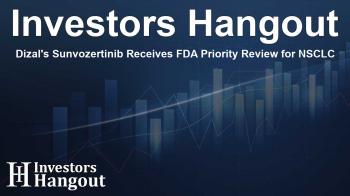Dizal's Sunvozertinib Receives FDA Priority Review for NSCLC

FDA's Priority Review of Sunvozertinib: A Game Changer for NSCLC
Dizal is making headlines with the announcement that the U.S. Food and Drug Administration (FDA) has granted priority review for the company's New Drug Application (NDA) for Sunvozertinib. This oral EGFR inhibitor holds the promise of offering a significant treatment option for patients suffering from non-small cell lung cancer (NSCLC) with specific EGFR mutations.
Why Sunvozertinib is Significant
If approved, Sunvozertinib would offer a safe and efficient oral treatment for NSCLC patients afflicted with EGFR exon 20 insertion mutations. This innovative drug stands out because it provides an alternative for those who have limited options following progression on prior platinum-based chemotherapy, which is a common first-line treatment for NSCLC.
The NDA has been submitted based on comprehensive data from the multinational pivotal WU-KONG1 Part B study, which highlights the efficacy and safety of Sunvozertinib. The study results were recently disclosed at a prominent oncology conference, showcasing its potential to significantly improve outcomes for these patients.
Understanding the FDA Review Process
The FDA’s priority review designation is reserved for medications that offer significant improvements in safety or efficacy compared to existing treatments. This status not only accelerates the review timeline but also reflects the agency's recognition of the clinical needs of NSCLC patients. Previously, Sunvozertinib had also received Breakthrough Therapy Designation for its promising results in treatment-naïve settings.
Currently, no similar drugs are available in the U.S. or Europe, making the potential introduction of Sunvozertinib a groundbreaking development in the fight against NSCLC.
Key Study Findings
The efficacy data, derived from the WU-KONG1 Part B study, demonstrates statistically significant clinical benefits for relapsed or refractory NSCLC patients. This is crucial because patients with EGFR exon20ins often face considerable prognostic challenges and limited therapeutic options.
Dr. Xiaolin Zhang, CEO of Dizal, emphasized the urgency of the situation: "Patients with EGFR exon20 insertion mutations face a poor prognosis and have limited treatment options. Sunvozertinib's Priority Review designation marks a significant regulatory milestone for our efforts in addressing these unmet medical needs."
Dizal's Commitment to Innovation
In the world of cancer treatment, Dizal is at the forefront of innovation. Sunvozertinib’s recent approval in China marks its status as the first and only oral medication for patients with EGFR exon20ins. This approval underlines the commitment that Dizal has made to advance treatments tailored to the complexities of cancer.
Dizal scientists have engaged in extensive research, leading to the development of Sunvozertinib. This irreversible EGFR inhibitor targets a range of EGFR mutations while selectively sparing wild-type EGFR, suggesting a unique mechanism that could contribute to its effectiveness.
Safety Profile and Market Potential
Clinical trials have demonstrated that Sunvozertinib maintains a well-tolerated safety profile, with most treatment-emergent adverse effects being Grade 1 or 2, making them manageable. This is an important aspect of any cancer treatment, as patients are often concerned not only about efficacy but also about the side effects that may accompany treatment.
Dizal is now conducting two global pivotal studies: one in a later-line treatment setting and another in the first-line context, further expanding the avenues through which Sunvozertinib may help NSCLC patients.
About Dizal
Dizal is dedicated to developing innovative therapeutics for cancer and immunological diseases. Their mission is to discover and commercialize first-in-class treatments that address significant medical needs worldwide. With a strong foundation in translational science, Dizal has achieved notable success, including two approved drugs and several assets under advanced stages of clinical development.
Frequently Asked Questions
What is Sunvozertinib?
Sunvozertinib is an oral EGFR inhibitor developed by Dizal for treating non-small cell lung cancer (NSCLC) patients with specific EGFR mutations.
What does priority review mean?
Priority review is an FDA designation indicating that the drug may provide significant improvements in safety or efficacy compared to existing therapies, speeding up the review process.
What are EGFR mutations?
EGFR mutations are changes in the epidermal growth factor receptor gene, which can lead to uncontrolled cell growth in various cancers, including lung cancer.
Why is this approval important for NSCLC patients?
This approval would offer a new treatment option for NSCLC patients who currently have limited choices, especially after failure on chemotherapy.
What are the ongoing studies related to Sunvozertinib?
Dizal is conducting pivotal studies to evaluate Sunvozertinib in relapsed or refractory NSCLC and in the first-line treatment setting for patients with EGFR mutations.
About Investors Hangout
Investors Hangout is a leading online stock forum for financial discussion and learning, offering a wide range of free tools and resources. It draws in traders of all levels, who exchange market knowledge, investigate trading tactics, and keep an eye on industry developments in real time. Featuring financial articles, stock message boards, quotes, charts, company profiles, and live news updates. Through cooperative learning and a wealth of informational resources, it helps users from novices creating their first portfolios to experts honing their techniques. Join Investors Hangout today: https://investorshangout.com/
Disclaimer: The content of this article is solely for general informational purposes only; it does not represent legal, financial, or investment advice. Investors Hangout does not offer financial advice; the author is not a licensed financial advisor. Consult a qualified advisor before making any financial or investment decisions based on this article. The author's interpretation of publicly available data shapes the opinions presented here; as a result, they should not be taken as advice to purchase, sell, or hold any securities mentioned or any other investments. The author does not guarantee the accuracy, completeness, or timeliness of any material, providing it "as is." Information and market conditions may change; past performance is not indicative of future outcomes. If any of the material offered here is inaccurate, please contact us for corrections.
